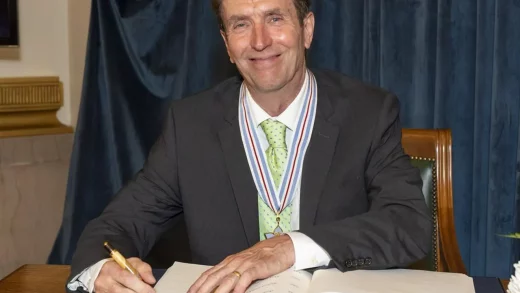:format(webp)/https://www.thestar.com/content/dam/thestar/entertainment/stage/2023/02/08/songs-for-murdered-sisters-margaret-atwood-poems-set-to-music-to-honour-opera-baritone-joshua-hopkins-murdered-sister/jake_heggie_and_joshua_hopkins_with_an_image_of_joshua_s_sister_and_her_family_i.jpg)
Joshua Hopkins, the internationally acclaimed Canadian baritone, was about to go into a rehearsal with Opera Lyra in Ottawa when he got a phone call that upended his existence.
On Sept. 22, 2015, in the course of a few hours, a man named Basil Borutski went on a deadly rampage in Renfrew County, west of Ottawa, and murdered three women, all former intimate partners. One of them was Hopkins’ much beloved older sister, Nathalie Warmerdam. She was 48 and a palliative care nurse. Borutski gunned her down at the farmhouse in Foymount where she was raising her two children. It’s not that distant from the Petawawa home where, as children, Josh and Nathalie had forged an exceptionally strong bond.
“I was immediately turned upside down,” said Hopkins, 44, on a Zoom call from Houston, Texas, where he and his wife, Zoe Tarshis, make their home.
“It was unfathomable to understand that my sister is alive and well and raising these two kids and then suddenly she’s been taken so brutally.”
It was not long after receiving the news that Hopkins knew he had to take action, to manage his own grief and to honour not only Nathalie’s memory but those of so many other women who’ve fallen victim to the violent rage of jealous former partners.
The result, five years later, was an emotionally powerful and at the same time beautiful song cycle called “Songs for Murdered Sisters,” eight new poems by the iconic Canadian author Margaret Atwood set to music by Jake Heggie, one of America’s most renowned composers.
At Hopkins’ instigation, “Songs for Murdered Sisters” was originally commissioned by the National Arts Centre Orchestra and Houston Grand Opera. Owing to the pandemic, the work first came to fruition in 2021 in a chamber version with the composer accompanying Hopkins on the piano. Director James Niebuhr filmed an almost overwhelmingly powerful performance of it in an abandoned former railway station in Oakland, Calif. Hopkins had a projected image of his sister and her children before him as he recorded the subsequent album.
Now, “Songs” will have its long-delayed orchestral premiere with the National Arts Centre Orchestra in Ottawa on Feb. 9 before arriving at Toronto’s Roy Thomson Hall two days later. The orchestra will also bring it to Kingston, Ont., Feb. 14.
“It was always the intention to have an orchestral arrangement,” said Heggie. “I always think orchestrally even if I’m writing for the piano. So I knew it was going to have a couple of different forms.”
San Francisco-based Heggie first worked with Hopkins when the Canadian singer arrived at Houston Grand Opera soon after graduating from Montreal’s McGill University. They have collaborated many times since. It was thus natural that Hopkins approached Heggie as his project took shape.
“I got to know about Josh’s singing and incredible ability as a singing actor and communicator,” said Heggie. “He’s such a deeply good person and that always registers with me, not only the talent but the human being. I was really keen to go on this journey with Josh right away.
“I always know if a project is right for me because I feel the music even if I don’t know what the music is yet. I feel that shiver and that recognition that this is something I not only want to do but that I must do.”
In considering the songs themselves, the two men mulled various ideas; perhaps existing words, or a mix of old and new. Eventually they made the bold decision to approach Atwood.
“I told them, ‘I can never agree to do something before I’ve done it’ because there’s nothing worse than saying you can do something and then finding that you actually can’t,” Atwood said in an interview. “So I said I’d take a crack at it. That’s how it happened.”
The 2015 Renfrew County murders of Carol Culleton, 66, Anastasia Kuzyk, 36, and of Warmerdam made international headlines. Atwood was fully aware of the case. She also knew two women, Pat Lowther and Debbie Rottman, who had met similar fates. At Atwood’s request, their names were included with those of the three Renfrew County women in the song cycle’s dedication but, at the time of writing, she had many others in mind.
“Over the years/So many sent away,” wrote Atwood in the cycle’s sixth poem, “Lost.”
The poems are included in Atwood’s 2020 collection “Dearly.”
Finding the right words to speak of such abominations might seem a daunting task even for as seasoned a writer as Atwood. She ended up writing them in one session.
“You may have noticed, I’m not a fainting violet,” said Atwood. “A writer of a more delicate kind than I am wouldn’t even try to do this; but I am not that person. And obviously Joshua knew that or he wouldn’t have asked me.”
The resulting poems move from the very personal — “Who is my sister/Is now an empty chair” — to a more universal consideration of loss.
Atwood’s love of birds finds expression in the fifth poem, “Bird Soul.” At its conclusion, the cycle returns to a more personal note of redemption and hope. “When I am singing this song for you/You are not empty air.”
“I was completely in tears,” said Hopkins, recalling the moment he first read the poems. “They spoke to me so deeply,”
He quickly sent Atwood a note of gratitude and, in the autumn of 2020, was able to follow it up with the first live performance of “Songs” in the author’s own Toronto back garden.
“It was wonderful,” remembered Atwood. “There were leaves all around. Josh put on the music then sang in the backyard because it was COVID and we were outside. Then, to top it all off, he did the Figaro song from ‘The Barber of Seville’ for my grandson.”
Heggie also fought back tears when he first read the poems.
“They just hit me to my core. The songs emerged pretty quickly,” he said. “The problem with some texts that people deliver for new songs is that there are too many words. We need room for the music to tell the emotional part of it and Margaret just instinctively understands that.”
“It’s not my first rodeo,” said Atwood. “I was well aware that writing-for-singing voice is quite different from writing-for-speaking voice.”
Hopkins regards “Songs for Murdered Sisters” as much more than a work of art and memorial to his sister.
“It was always our intention to create a piece that would help wake people up to the epidemic that is intimate partner and gender-based violence,” said Hopkins. “The advocacy of performing these songs is something that’s extremely important to me. We have to continue fighting and to pressure our elected government representatives to actually make concrete change.”
As part of his advocacy, Hopkins is challenging men to own their responsibility to end violence against women.
“We aim to motivate 10,000 men to take the White Ribbon Pledge, promising ‘never to commit, condone or remain silent about all forms of gender-based violence.’”
In the seventh poem Atwood writes of the urge for revenge — “To kill the man who killed you/That would be only fair” — but ends it with “Would you instead forgive?”
Basil Borutski is now serving a 70-year jail sentence.
JOIN THE CONVERSATION



